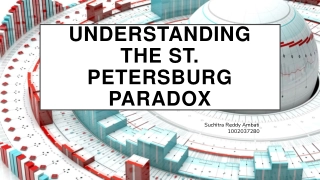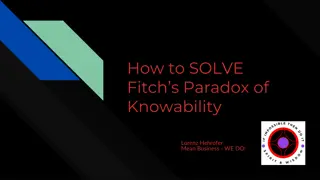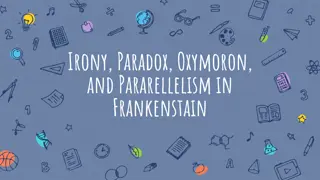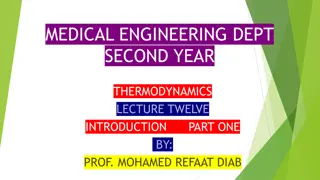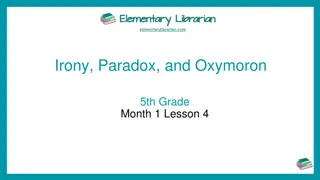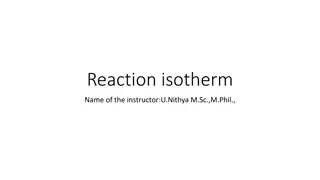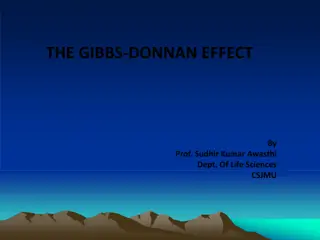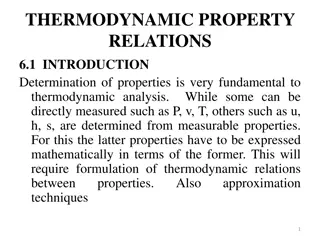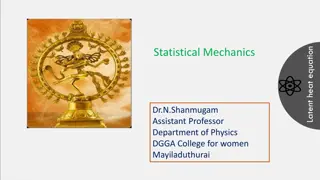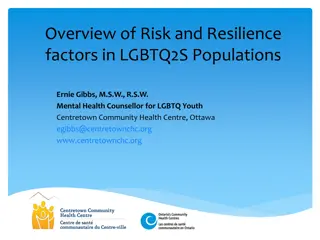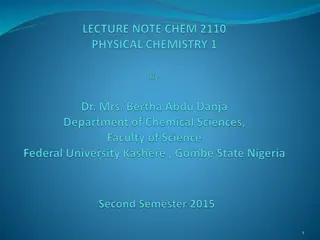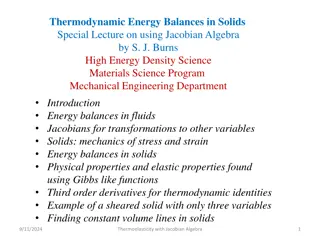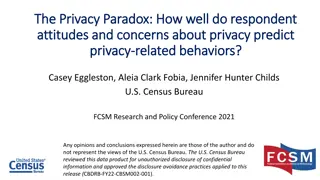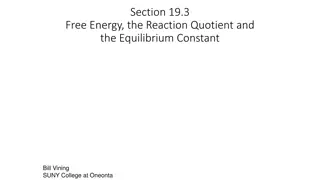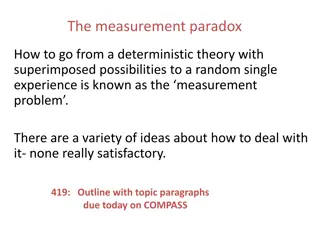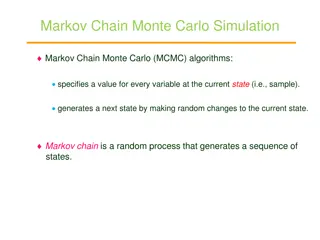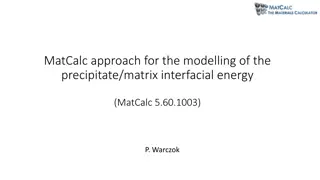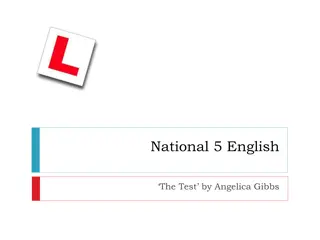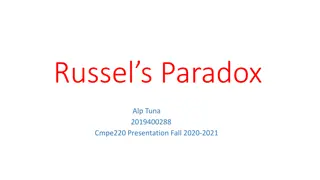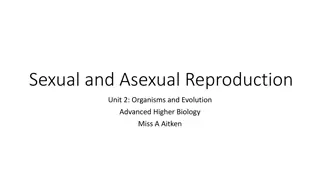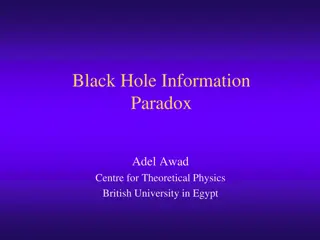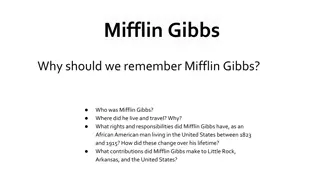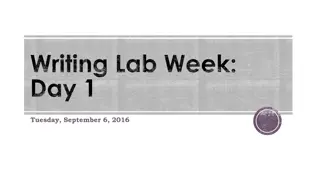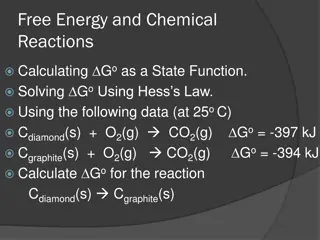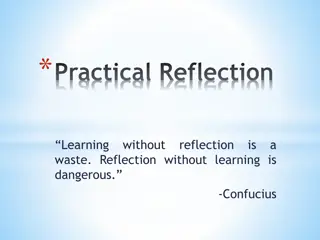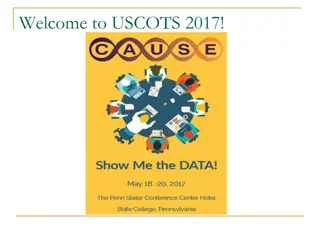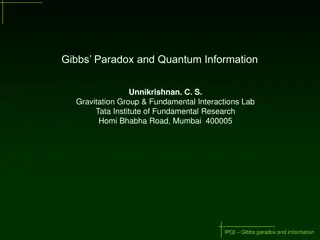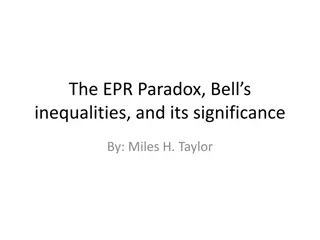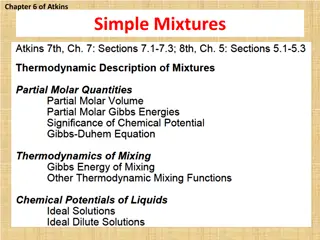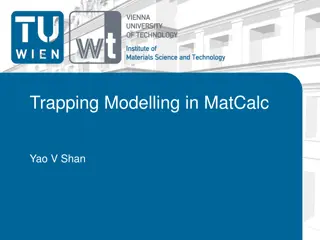Understanding the St. Petersburg Paradox
The St. Petersburg Paradox, a thought experiment challenging traditional decision theory, rational behavior, and more. Understand the infinite expected value in a gambling game, its implications, and the paradox it presents.
7 views • 22 slides
Understanding the Paradox of Plankton and Biodiversity Correlates
The paradox of plankton challenges the theory that the number of species should match available resources, as seen in diverse plankton ecosystems. Explanations include resource partitioning, temporal and spatial heterogeneity, predation, adaptation to disturbance, and evolutionary processes. Biodive
3 views • 40 slides
Understanding Chemical Potential and Phase Equilibria in Solution Thermodynamics
The chemical potential and phase equilibria in solution thermodynamics are crucial concepts for understanding the behavior of mixtures at varying compositions and conditions. By investigating the fundamental property relation, partial molar properties, and the role of Gibbs energy, we can grasp how
5 views • 25 slides
The Automation Paradox
Exploring the concept of the automation paradox, this analysis delves into the writer's claim about automation as a paradox and how it relates to the results of software and McKinsey & Company studies. The information in graphs and the writer's use of transitions are evaluated, highlighting the need
0 views • 12 slides
Solving Fitch's Paradox of Knowability Using Fractal Mathematics
Explore how to tackle Fitch's Paradox of Knowability through the use of fractal mathematics, DSI (Deterministic Search of Infinity) algorithm, and interstellar data compression. By understanding the scopes of knowability and employing innovative solutions, such as compressing massive amounts of data
0 views • 9 slides
Irony, Paradox, Oxymoron, and Parallelism in Frankenstein
Exploring the concepts of irony, paradox, oxymoron, and parallelism in Mary Shelley's "Frankenstein." The discussion covers different types of irony such as situational, verbal, and dramatic, highlighting instances from the novel. Additionally, the concept of paradox is examined, showcasing statemen
0 views • 16 slides
Understanding Maxwell Equations in Thermodynamics
In thermodynamics, Maxwell equations are derived using Euler's reciprocity relation. They involve characteristic functions such as internal energy, free energy, enthalpy, and Gibbs free energy, along with parameters like temperature, entropy, pressure, and volume. These equations form the foundation
0 views • 15 slides
Understanding Irony, Paradox, and Oxymoron in Figure of Speech
Exploring the concepts of irony, paradox, and oxymoron through examples and exercises in a lesson designed for 5th-grade students. Students learn to identify these figures of speech that show contrast and contradiction, enhancing their understanding of language and expression. The lesson provides ex
2 views • 8 slides
Understanding Reaction Isotherms and Equilibrium Constants
Explore reaction isotherms and equilibrium constants through Vant Hoff's and Gibbs free energy equations. Learn about the relationship between Gibbs free energy, equilibrium constant, and temperature dependence. Discover how these concepts are applied in determining the direction of chemical reactio
1 views • 18 slides
Understanding the Gibbs-Donnan Effect in Biological Systems
The Gibbs-Donnan Effect, named after physicists Gibbs and Donnan, explains the selective permeability of membranes to ions, leading to the establishment of Donnan potential. This phenomenon affects the distribution of ions and proteins across cell membranes, influencing processes like osmosis and io
0 views • 27 slides
Fundamentals of Thermodynamic Property Relations
Determining thermodynamic properties is crucial for analysis, involving direct and derived properties expressed through formulations and relations. Partial derivatives, fundamental relations like the 1st and 2nd laws, and functions such as enthalpy, Helmholtz, and Gibbs are explored. Maxwell relatio
2 views • 56 slides
Understanding Phase Transformations and Latent Heat Equation in Statistical Mechanics
In this informative piece by Dr. N. Shanmugam, Assistant Professor at DGGA College for Women, Mayiladuthurai, the concept of phase transformations in substances as they change states with temperature variations is explored. The latent heat equation is discussed along with definitions of fusion, vapo
1 views • 22 slides
Risk and Resilience Factors in LGBTQ2S Populations
This presentation by Ernie Gibbs, a Mental Health Counsellor, explores risk and resilience factors impacting LGBTQ2S youth. It delves into terminology, risk factors like depression and violence, as well as resilience factors such as family acceptance and access to medical transition services. The di
0 views • 10 slides
Understanding Kinetic Theory of Gases and Thermodynamics
Explore the fundamental principles of the kinetic theory of gases, including the five postulates and the relationship between macroscopic properties and microscopic phenomena. Delve into the concept of entropy and thermodynamics, along with the behavior of ideal and real gases. Gain insights into th
0 views • 116 slides
The Grim Reaper Paradox: A Metaphysical Inquiry into Time and Causation
Exploring the intriguing Grim Reaper paradox and its implications on the necessity of finitude in time and causation, this content delves into various philosophical arguments surrounding the concept of infinity and the nature of existence. Through detailed analyses of different paradoxes and argumen
0 views • 33 slides
Understanding Thermodynamic Energy Balances in Solids with Jacobian Algebra
Explore the intricacies of energy balances in solids through the lens of Jacobian algebra, covering topics such as mechanics of stress and strain, Gibbs-like functions for physical properties, and third-order derivatives for thermodynamic identities. Unravel the application of Jacobians for transfor
2 views • 26 slides
Mrs. Gibbs' First Grade Class Information
Welcome to Mrs. Gibbs' First Grade Class! Join us for a year of fun, learning, and community. Meet Mrs. Gibbs and learn about her family, goals, class subjects, classroom community, homework expectations, and school policies like tardiness. Get ready for an exciting year ahead!
0 views • 10 slides
College Planning Night at Gibbs High School Counseling Office
Gibbs High School hosts a College Planning Night with school counselors and representatives from colleges discussing topics like what college is, types of degrees, planning for college, and how to pay for college. Students learn about different degree options like diplomas, certificates, associate d
0 views • 30 slides
Understanding the Privacy Paradox: Attitudes vs. Behaviors
Social scientists have identified a Privacy Paradox where individuals with strong privacy concerns may not always engage in behaviors that protect their privacy. While some studies show a discrepancy between attitudes and behaviors, others suggest that privacy-concerned individuals do employ privacy
0 views • 14 slides
Understanding Free Energy, Reaction Quotient, and Equilibrium Constant
This educational material delves into the concepts of free energy, reaction quotients, and equilibrium constants in chemical systems. It explains how to determine the direction of a reaction based on Q and K values, elucidates the role of Gibbs free energy in determining spontaneity, and provides ca
0 views • 10 slides
Unraveling the Quantum Measurement Paradox
The measurement paradox delves into the challenge of transitioning from deterministic theories with superimposed possibilities to random single experiences. Various ideas attempt to address this issue, yet none are entirely satisfactory. Explore concepts like the collapse of the wavefunction, Schrö
0 views • 22 slides
Understanding MCMC Algorithms and Gibbs Sampling in Markov Chain Monte Carlo Simulations
Markov Chain Monte Carlo (MCMC) algorithms play a crucial role in generating sequences of states for various applications. One popular MCMC method, Gibbs Sampling, is particularly useful for Bayesian networks, allowing the random sampling of variables based on probability distributions. This process
1 views • 7 slides
Understanding MatCalc Approach for Modelling Precipitate/Matrix Interfacial Energy
MatCalc app provides a detailed examination of the precipitate/matrix interfacial energy modeling by considering various contributions to Gibbs energy, classical nucleation theory, coarsening (Ostwald ripening), and estimation methods like the Becker concept. The interface energy is crucial for unde
1 views • 33 slides
Analyzing "The Test" by Angelica Gibbs: Themes of Prejudice and Injustice
The Test" by Angelica Gibbs is a short story that delves into themes of prejudice, injustice, and racism. Through the experiences of the protagonist, Marian, the narrative explores how discrimination affects individuals. The story prompts readers to reflect on issues of bias and unfair treatment in
0 views • 50 slides
The Paradox of Choice: Too Many Good Options?
The paradox of choice delves into the debate between standard economics supporting the benefits of numerous options and experimental findings suggesting that hyperchoice can lead to decision paralysis and decreased satisfaction. While more choices may seem advantageous, excessive options can have ne
0 views • 46 slides
Understanding Russell's Paradox: A Dive into Set Theory
Delve into Russell's Paradox, a foundational issue in mathematics arising from naive set theory. Explore how the paradox challenges the notion of definable collections as sets, ultimately leading to the development of advanced solutions in set theory such as the ZFC axioms and the Axiom of Separatio
0 views • 6 slides
Understanding Reproduction: Sexual vs Asexual and the Paradox of Sex
Explore the benefits and drawbacks of sexual and asexual reproduction in organisms, why both forms exist, and the paradox of sex. While asexual reproduction offers efficiency and simplicity, sexual reproduction introduces genetic diversity and complexity. Discover how different species, including pr
0 views • 8 slides
Understanding the Black Hole Information Paradox
Explore the classical concepts of black holes in General Relativity, including the Schwarzschild Solution and the definition of black holes. Delve into quantum effects and the ongoing debate surrounding the Black Hole Information Paradox.
0 views • 19 slides
Mifflin Gibbs: Trailblazer of Little Rock
Mifflin Gibbs, the first colored judge in the United States, lived an impactful life between 1823 and 1915. He made significant contributions to Arkansas and the U.S., overcoming challenges as an African American man. Gibbs's journey, achievements, and the evolving rights and responsibilities he fac
0 views • 13 slides
Religious Pluralism and Civil Society: A Paradox in Government Control
Understanding the intricacies of religious pluralism in the context of government control reveals a paradox where restricting religion can hinder social cohesion and economic growth. Through insights on the counterproductivity of control, the role of religious organizations in civil society, and the
0 views • 16 slides
Analysis of Irony and Paradox in Narayan and Saki's Stories
Explore the use of irony and paradox in the works of R.K. Narayan and Saki to highlight the themes of truth, deception, and honesty. Compare and contrast how the authors present these concepts, providing evidence from the texts to support your analysis. Identify examples of dramatic, situational, an
0 views • 35 slides
Understanding Free Energy and Chemical Reactions
Exploring concepts like Gibbs free energy, standard free energy of formation, equilibrium, and Hess's Law in chemical reactions. The feasibility of reactions, equilibrium constants, and the impact of pressure on free energy are all discussed.
0 views • 17 slides
Enhancing Learning Through Reflective Practices: A Comprehensive Guide
Explore the significance of reflection in professional development, understanding various reflective practices, and engaging in activities to foster individual and group reflection. Discover the dynamics of cyclical learning, the cognitive and affective aspects of reflection, frameworks for improvem
0 views • 12 slides
Show Me the Data: Highlights from USCOTS 2017
USCOTS 2017 had a theme centered around data-driven decision-making in education. The event featured insightful presentations by renowned speakers like Chris Wild and Alison Gibbs. Attendees were encouraged to engage with data visualization and explore the realm of data science. The event emphasized
0 views • 17 slides
Gibbs Paradox and Quantum Information: Understanding Entropy and Resolution
Description of the Gibbs problem of entropy mixing gases, conventional resolution, issues of (dis)continuity, the role of indistinguishability and quantum mechanics in resolution, dissenting views, necessity of quantum mechanics, and the relationship between statistical mechanics and entropy. Key di
0 views • 19 slides
Unveiling the Significance of the EPR Paradox and Bell's Inequalities
Physicists Albert Einstein, Boris Podolsky, and Nathan Rosen introduced the EPR paradox in 1935 to challenge the completeness of quantum mechanics through a thought experiment, highlighting issues in quantum entanglement and observable properties. Bohr's reaction emphasized the incompatibility of EP
0 views • 9 slides
Understanding Partial Molar Quantities and Chemical Potential
Exploring partial molar quantities and chemical potential in thermodynamics helps us understand how system variables change with composition alterations. Through concepts like partial molar volumes and Gibbs free energy, we can delve into the intricate dynamics of thermodynamic systems and their beh
0 views • 23 slides
Understanding Thermodynamics of Mixing in Atkins: Chapter 6 Overview
Unveil the intricacies of Chapter 6 from Atkins' book on Simple Mixtures. Delve into topics like Partial Molar Volume, Gibbs Energies, Chemical Potential, Gibbs-Duhem Equation, Thermodynamics of Mixing, and more. Explore key concepts such as Gibbs Energy of Mixing, Raoult's Law, Molecular Interpreta
0 views • 22 slides
Navigating the Compassion Paradox: Exploring Wicked Questions with Liberating Structures
Explore upcoming events focused on addressing the compassion paradox, peer-to-peer approaches, and staff wellbeing. Discover resources for relaxation, identifying priorities for staff wellbeing SIG, and tools for maintaining compassion in challenging environments.
0 views • 14 slides
Trapping Modelling in MatCalc: Understanding Gibbs Energy and Configurational Entropy
Trapping modelling in MatCalc involves studying the entrapment of atoms on lattice defects like solute atoms and dislocations. This process affects the system's energy and concentration, with parameters such as trapping enthalpy, nominal composition, and molar volume playing vital roles. By consider
0 views • 21 slides
